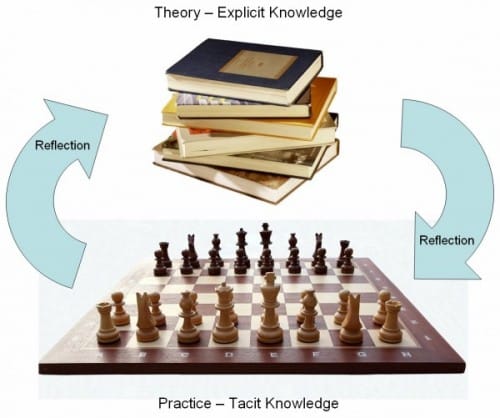There are two ways of knowing things, and they build upon each other. Those two ways are:
- Tacit knowledge – difficult to articulate; usually defined as “know-how” or “street-smarts”. It can be transmitted through stories, through social interactions in a group, and through personal experience.
- Explicit knowledge – codified in language and discourse. It is the facts and figures that can be transmitted by books and dialogue.
An example of tacit knowledge can be seen with a child learning how to hit a nail with a hammer for the first time. You can codify the process to hit the nail with the hammer and explain it to the child as explicit knowledge. But the child only develops the actual skill to do it by taking action, and through trial and error, discovering how to hold the hammer and hit the nail properly.
The way humans gain mastery is through a loop of learning that goes over explicit and tacit knowledge. While the exact definition varies a bit from author to author, there is a word that represents this process: Praxis.
Praxis is a philosophical concept that consists of going through a loop between: Theory (explicit knowledge); Practice (tacit knowledge); and Reflection (internalizing and memorizing what we have learned). There is strong evidence that there’s a correlations between the learning process of Praxis and some studies on the cognitive aspects of skill acquisition.
For example, studies on skill acquisition in chess players show that only the individuals who spend a significant amount of time reading chess books ever reach the level of Grandmaster (http://psych.utoronto.ca/users/reingold/publications/PDFs/Charness.Tuffiash.Krampe.Krampe.Vasyukova.2005.pdf). Players who don’t read soon plateau, never to advance in their ranking regardless of hours spent practicing. Only the players who spend time reading see their ranking grow (sometimes exponentially) with every passing year.

We all have had the following experience: We are either listening to a book or listening to a speaker. Then there’s that one word we don’t understand. All of the sudden the meaning of the book or lecture has evaded us.
The goal of Career Mastery Games is not to be an end all solution. In order to succeed in your career you’re going to need real world experience, mentors, talented colleagues, good books and reflection. We aren’t offering you a complete diet, but a supplement pill to enhance your diet. As a professional you’re going to have to memorize hundreds if not thousands of new words. A manager alone is going to need to understand accounting, and depending on the industry they may need to become familiar with supply chain terminology, marketing, law, or technology, or all four. The game is directly aimed at improving your domain specific vocabulary. It’s an enhancement to your explicit knowledge (but NOT a substitute to reading books and articles from your industry, albeit it will improve your comprehension).
But one way we do hope to improve your tacit knowledge is by the network you’ll build with other players. The hope is to attract ambitious men and women who will be both your competitors and cheerleaders. The game will bring together those in your profession serious about self-improvement, and hopefully you can start benefiting from knowing each other outside the game by having met in the game. This we hope will create more colleagues, mentors, employees and business partners.
“While tacit knowledge can be possessed by itself, explicit knowledge must rely on being tacitly understood and applied. Hence all knowledge is either tacit or rooted on tacit knowledge. A wholly explicit knowledge is unthinkable.” Michael Polanyi, Knowing and Being